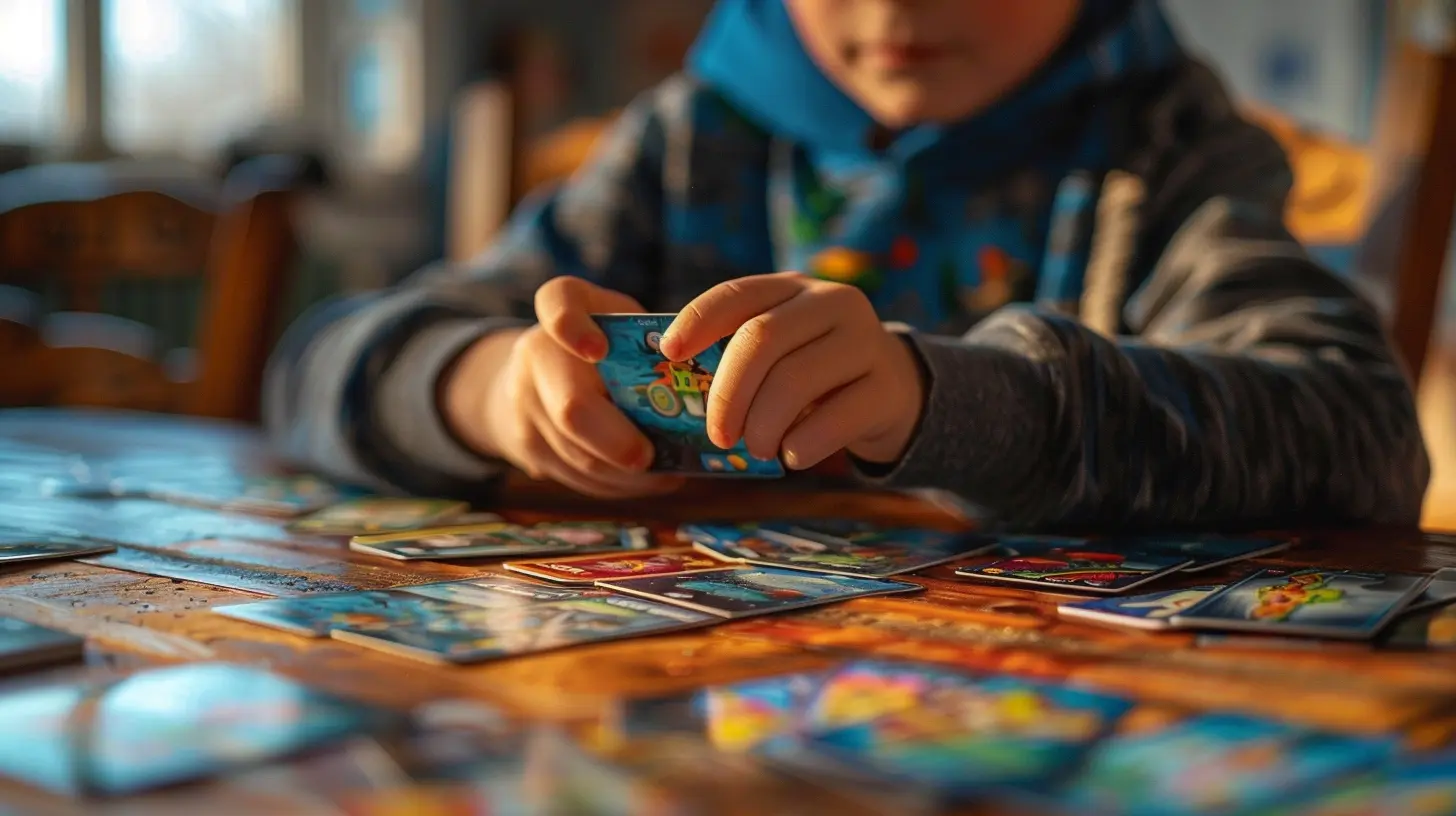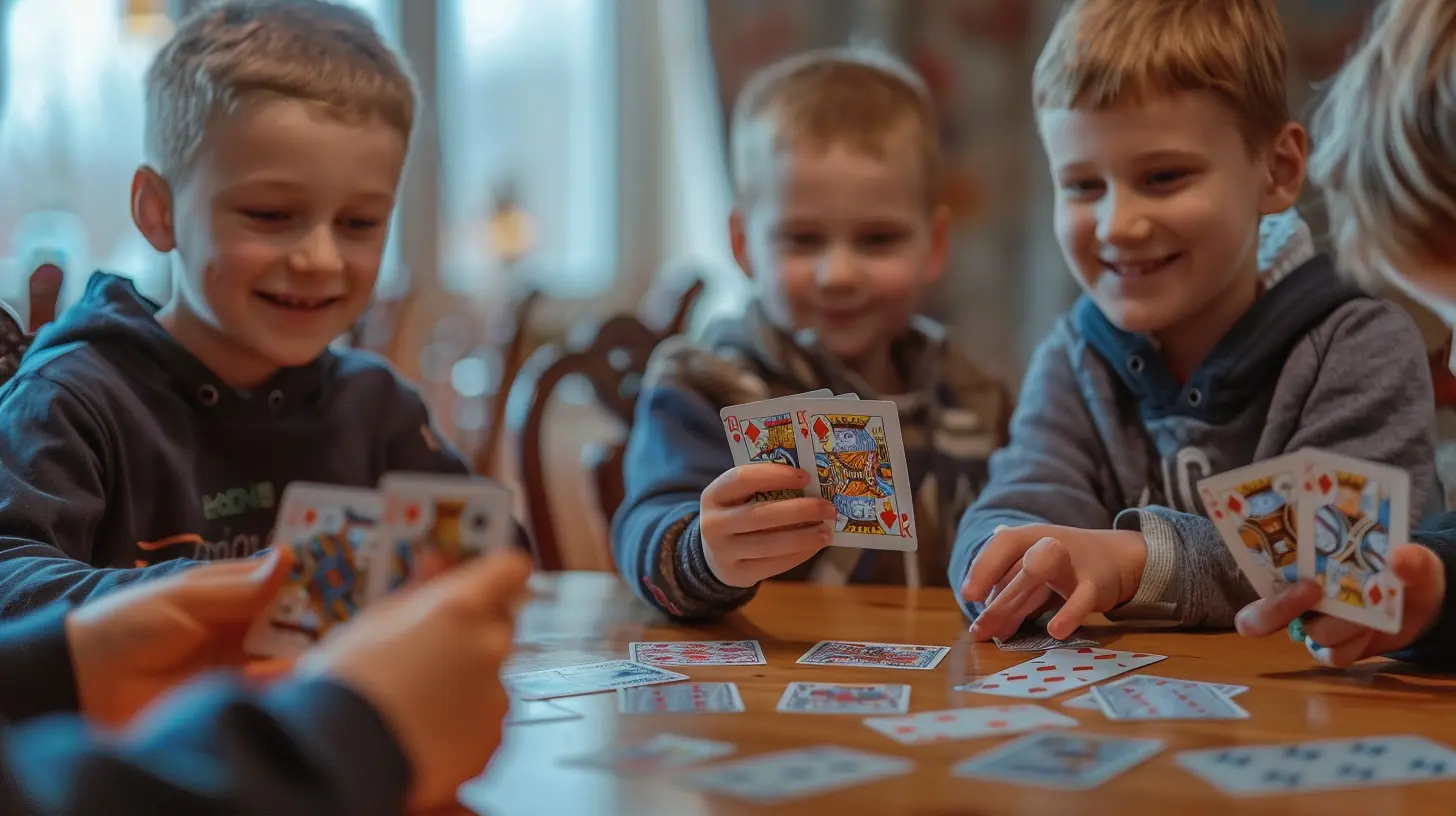Teaching Kids Math Through Card Games
11 April 2025
Let’s be real—teaching kids math can feel like trying to convince a cat to take a bath. The eye rolls, the groans, the sudden fascination with literally anything else in the room—it’s a whole mood. But what if I told you there’s a sneaky way to make math not just tolerable, but genuinely fun? Enter: card games.
Yep, those little rectangles of joy you probably associate with late-night poker or epic Uno battles can turn into your secret weapon for math mastery. It’s a classic case of disguising vegetables as candy, except this time, the "veggies" are multiplication tables, and the "candy" is some good ol' competitive family fun.
So, grab your deck of cards (or borrow one if your kids have turned them into makeshift bookmarks), and let’s dive into how card games can help teach math in the most entertaining way possible. 
Why Card Games Are Perfect for Learning Math
Let’s face it—kids learn best when they’re having fun. And no, I’m not saying you need to hire a Broadway performer to jazz up your times tables. Card games do the heavy lifting for you.Card games are interactive, low-pressure, and let kids practice math without feeling like they’re in some kind of academic boot camp. Plus, they're portable and low-tech—no screens, no batteries, no "Mom, your phone died so I can't finish my homework!" excuses.
But what makes card games such math geniuses? It’s all about tapping into basic math skills like addition, subtraction, multiplication, and even probability (no, I’m not asking your 7-year-old to predict Vegas odds). They help kids sharpen their mental math muscles while having a blast—and isn’t that the dream? 
The Math Magic of Cards: A Quick Breakdown
Before we jump into game ideas, let’s look at some skills kids can build with cards:- Counting skills: Laying cards out and keeping track of numbers? Boom. Instant counting practice.
- Addition and subtraction: Every card game you play will sneak in some arithmetic.
- Multiplication and division: Some card games ramp up the challenge, turning you into a math whiz without you even realizing it.
- Critical thinking: Choosing which card to play, strategizing your moves—all of this builds problem-solving skills that are basically Jedi training for the brain.
- Probability and logic: Even simple games like "Go Fish" can spark thinking around patterns and odds, believe it or not. 
Card Games That Sneak Math into Playtime
Here are some fantastic card games guaranteed to teach math while keeping everyone entertained. Trust me, even the most reluctant "I hate math" kiddo will get hooked.1. Math War
If your kids enjoy a good showdown, Math War is the way to go. Think of it as regular War, but with a mathy twist.How to Play:
1. Divide the deck equally between players.2. Each player flips over the top two cards of their pile.
3. Use those two cards to solve a math problem: addition, subtraction, multiplication—whatever your math curriculum du jour is.
4. The player with the higher answer wins the round and keeps the cards.
5. Whoever ends up with the most cards by the end wins.
Why It’s Great:
It’s fast-paced, competitive, and perfect for brushing up on mental math skills. Plus, kids get that little adrenaline rush every time they win a round (and who doesn’t love that?).2. 21 (Simplified Blackjack)
Ok, I know what you’re thinking—"You want me to teach my kids gambling??" Relax. This is the G-rated version. No late-night Vegas trips required.How to Play:
1. Take turns drawing cards and trying to get as close to 21 as possible without going over.2. Assign face cards a value of 10 and Aces a value of 1 or 11.
3. Players must add up the total value of their cards as they go along.
Why It’s Great:
This game hones addition and estimation skills. It’s also a good introduction to probability since kids start picking up on what cards are left in the deck.3. Make 10
A favorite for younger kiddos, Make 10 is simple yet super satisfying.How to Play:
1. Lay out 12 cards face-up on the table.2. The goal is to find pairs of cards that add up to 10.
3. Once players spot a pair, they remove the cards and set them aside. New cards are drawn to replace them.
4. Keep going until no more pairs can be made.
Why It’s Great:
This game reinforces addition skills and number sense. Plus, it has a built-in "seek-and-find" vibe that kids love.4. Crazy Eights with Multiplication
Take a classic like Crazy Eights and sprinkle some multiplication magic on top.How to Play:
1. Play Crazy Eights as usual, but with one twist: Whenever a player puts down a card, they must multiply it by a "magic number" (e.g., 2, 3, or 4).2. If they can’t give the correct product, they have to draw another card.
Why It’s Great:
It turns multiplication into a reflex. Kids will be calculating 7 x 3 faster than they can say "Uno!"5. Fraction Frenzy
This one’s perfect for older kids who are leveling up to fractions.How to Play:
1. Assign suits to fractions (e.g., Hearts are ½, Spades are ¼).2. Players draw two cards and "add" their fractions. For example, if they draw a 2 of Hearts and a 3 of Spades, they’re adding ½ + ¾.
3. The player with the largest fraction wins the round.
Why It’s Great:
It’s a genius way to demystify fractions while making them less intimidating.
Benefits Beyond Math
Here’s the kicker: playing card games isn’t just about math skills. You’re also boosting other life skills like:- Patience: Waiting for your turn is a life skill, even if it doesn’t always feel impressive in the moment.
- Sportsmanship: Celebrate wins, brush off losses, and move on. It’s like resilience boot camp but fun!
- Communication: Explaining rules, debating scores—card games encourage good ol' human interaction (something we could all use more of).
And let’s not forget the best part: bonding time. Card games create memories, inside jokes, and enough laughs to make even long division seem bearable.
Tips for Getting Started
Ready to jump in? Here are some quick tips to make sure your card game adventures go off without a hitch:1. Start with simple games: If math isn’t your kiddo’s strong suit yet, stick to games that focus on addition or counting. Build from there.
2. Let them win (sometimes): Nothing boosts confidence like a taste of victory—and trust me, they’ll beat you fair and square in no time.
3. Make it a family affair: Get siblings, cousins, or even grandma involved. The more, the merrier.
4. Customize the rules: Don’t be afraid to tweak games to fit your child’s age or skill level. The goal is to make math approachable.
Wrapping Up
Using card games to teach math is like sneaking spinach into a smoothie—it’s a win-win situation. Kids get the math practice they so desperately need (even if they don’t realize it), and you get to enjoy some quality family time that doesn’t involve arguments about screen time.So, grab a deck of cards, shuffle ‘em up, and get ready to deal a little fun into your math routine. Who knows? You might end up enjoying it just as much as the kids do. (And hey, if they start dominating Math War, you’ve got yourself a little prodigy on your hands.
all images in this post were generated using AI tools
Category:
Card GamesAuthor:

Madeleine McCaffrey
Discussion
rate this article
5 comments
Hailey Carter
This article highlights an innovative approach to math education. Using card games can make learning engaging and fun for kids, fostering critical thinking and problem-solving skills. It's a refreshing reminder that play can be an effective teaching tool in mathematics.
May 18, 2025 at 2:35 PM

Madeleine McCaffrey
Thank you for your thoughtful comment! I’m glad you found the approach engaging—play truly can transform learning!
Isaac McIntyre
Great article! Using card games to teach math is a fun and engaging approach. It not only enhances kids' skills but also makes learning enjoyable. Keep up the fantastic work!
April 30, 2025 at 3:09 AM

Madeleine McCaffrey
Thank you for your kind words! I'm glad you enjoyed the article and appreciate your support for fun learning methods!
Damian Lewis
Fun way to learn math!
April 23, 2025 at 3:39 PM

Madeleine McCaffrey
Thank you! We're glad you enjoyed it! Card games make learning math engaging and enjoyable for kids.
Maria Marks
Integrating card games into math education effectively engages children while making learning enjoyable. These activities can enhance critical thinking and problem-solving skills, providing a practical and interactive approach to mastering mathematical concepts.
April 17, 2025 at 2:33 PM

Madeleine McCaffrey
Thank you for your insightful comment! I completely agree that card games can make math learning engaging and enhance essential skills in a fun way.
Clarissa McConnell
This article highlights a creative approach to teaching math that blends fun with learning. Using card games not only engages kids but also fosters critical thinking and problem-solving skills. It's a refreshing reminder that education can be enjoyable, making it easier for children to grasp essential concepts.
April 17, 2025 at 2:35 AM

Madeleine McCaffrey
Thank you for your insightful comment! I'm glad you enjoyed the article and see the benefits of blending fun with learning in math education.




